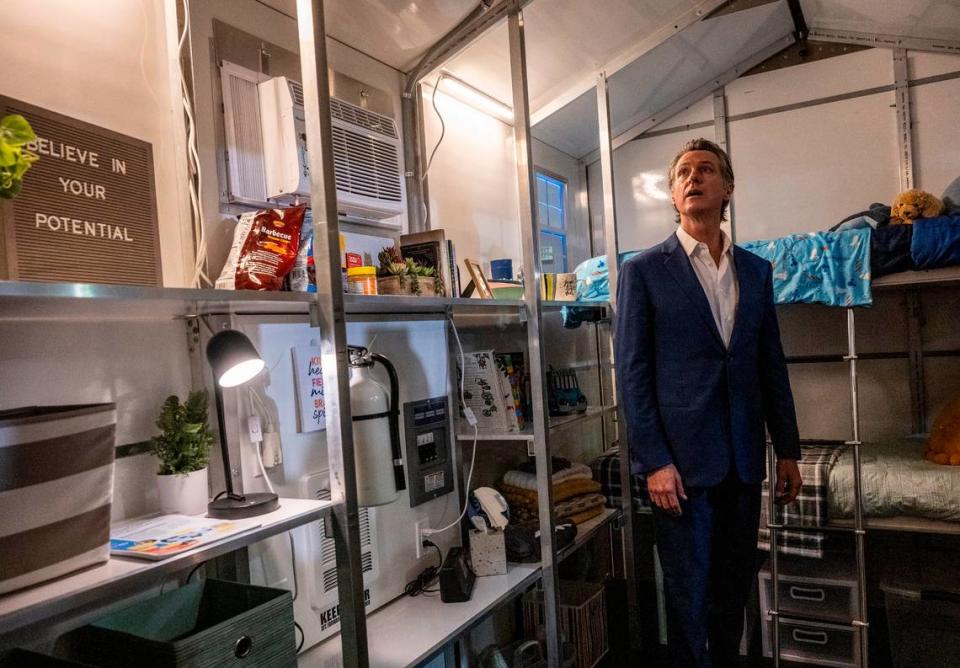Gavin Newsom promised 350 tiny homes for Sacramento’s homeless this fall. So where are they?
Seven months after Gov. Gavin Newsom promised that by the fall California would gift 1,200 tiny homes for unhoused residents to cities across the state, including 350 to Sacramento, officials have not selected a builder nor awarded any contracts.
All 1,200 homes will likely not be delivered and ready to house people until early to mid-2024. That will be roughly a year after the governor, touting the state’s investment, acknowledged that “people are dying on our watch.”
The delay comes as Newsom has been demanding accountability from cities and counties to address the state’s worsening homelessness crisis and eliminate encampments. Earlier this year, the governor briefly withheld the release of state funding because he said local leaders lacked ambitious plans and were “failing to meet the urgency of this moment.”
“He needs to be held accountable as well,” said Bob Erlenbusch, executive director of the Sacramento Regional Coalition to End Homelessness.“It’s not acceptable to have a double standard to critique cities and counties up and down the state and then turn around and not deliver on your promises in a timely way.”
Failing to live up to his pledge and deliver the tiny homes before the winter months will have fatal consequences for those sleeping outdoors, according to Erlenbusch.
“It’s just unconscionable to tell you the truth,” he said.
California’s delivery of tiny homes gets delayed
The California Department of General Services, which oversees state purchasing, has moved back its timeline at least three times, according to documents on the Cal eProcure website.
A presentation given during a bidding conference in May stated that the agency anticipated awarding a contract by July 14. That date was later pushed back to August 31. Contracts are now expected to be finalized by the end of October, according to the latest update from the Newsom administration.
The governor’s office and the Department of General Services declined multiple interview requests for this story. The Department also did not respond to questions about the delay and when the homes will be ready to start welcoming tenants.
“The state has made significant progress on this project,” Newsom spokesperson Daniel Lopez wrote in an email, adding that officials are “currently working on reviewing and finalizing those bids for inclusion in the final contract.”
Following questions from The Sacramento Bee, the governor’s office late Tuesday sent out a release detailing the governor’s latest efforts to combat homelessness, including an update on the tiny home projects.
The statement said the “largest delivery of small homes in state history continues to gain momentum” and that the state “anticipates the first groundbreaking to take place before the end of the year.”
Officials also announced an additional $179 million in Homekey grants to convert hotels, motels and other residential or commercial properties into 710 new units for homeless individuals in Fresno, Los Angeles, Modesto, Sacramento, San Buenaventura, San Diego and Visalia.
“The state’s homelessness crisis has been decades in the making,” Newsom said in the release. “While there’s more work to be done, we are challenging the status quo with new, innovative solutions to get Californians off the streets and into housing.”
Housing manufacturers were asked to provide dozens of designs
Under the plan announced by Newsom in March, Sacramento will receive 350 tiny homes, Los Angeles will get 500 units, San Diego County 150 and San Jose 200. The state anticipates spending about $30 million to build, deliver and install the homes, the governor’s office said in March. The local jurisdictions will then own the units and pay operating costs.
Foldum Corporation, a Tiny House manufacturer, is one of the companies in the running for the state contract.
Ryan Rossi, co-founder and CEO, said he has submitted more than 600 pages of drawings and paperwork to the state and that the company has been asked to revise its application about six times.
“We were expecting them to be done with the review and approving the (request for proposals) and get started on the manufacturing several months ago,” Rossi said. “But at the same time, they have been communicating with us almost every week.”
The state asked bidders to submit drawings for more than 50 different cabin designs — from standard studio rooms to two-bedroom units with accessible showers and bathrooms and dozens of variations in between.
Once the contracts are finalized and cities have selected their desired designs, the state is asking contractors to deliver their first 50 units within three months. Every month thereafter, they’re asked to complete another 50.
At that pace, Rossi estimates that the full 1,200 units could be installed by mid-2024, depending on how many manufacturers the state selects.
Sacramento and San Jose prepare for homeless housing
The tiny homes represent only a small fraction of the housing needed for Californians currently living on the streets. More than 6,000 people are sleeping outdoors in Sacramento on any given night, according to the latest homeless count.
Sacramento County this summer opened a tiny home project with about 100 units at 8144 Florin Road. The county expects to open a second, smaller site in the fall with 45 cabins on East Parkway.
As for the units gifted by the state, Sacramento leaders have selected two sites, one at an abandoned office park in the city’s Little Saigon neighborhood on Stockton Boulevard, which WellSpace Health plans to turn into a medical campus, and another at the 350-acre Cal Expo campus.
The WellSpace Health site is expected to hold 175 homes, which will be operated by the county, for temporary use while construction of the company’s health and wellness campus is underway. It is unclear what will happen to the tiny homes once WellSpace’s medical campus nears completion.
The governor’s office said this week that Cal Expo is a “confirmed site” but that they are still working on specifics with Cal Expo and local leaders.
Sacramento Mayor Darrell Steinberg’s office did not return requests for an interview.
In a statement included in the governor’s release, Steinberg celebrated the Stockton Boulevard site as a “model for the rest of the state.”
“Residents will be embedded in a community wellness campus specializing in substance abuse disorder treatment and mental health care,” his statement read. “This combination of housing and assertive treatment is the recipe for helping our unhoused neighbors and providing relief to our neighborhoods.”
The mayor previously told The Bee city plans to prioritize the new housing units for people camping under overpasses along the W-X corridor, in hopes of tidying up that area.
Meanwhile, San Jose secured an agreement earlier this month to place the city’s allotment of 200 homes on 7.2 acres owned by the Santa Clara Valley Transportation Authority.
San Jose Mayor Matt Mahan said he’s excited about the governor’s investments but that the city “is not waiting on the state.”
In addition to the homes that will be gifted from the state, San Jose is working to build another 400 new emergency interim housing units within the next year.
“We are full steam ahead,” Mahan said. “... I have always had the belief that solving this crisis will require every city, every county, every jurisdiction that has public land to identify sites for interim and permanent affordable housing, and we will need to move forward many sites at once.”



